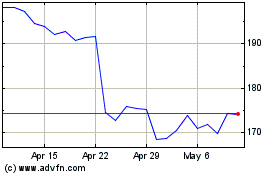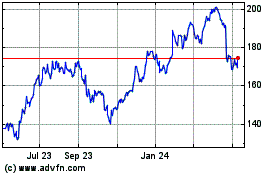By Nick Timiraos and Rebecca Ballhaus
This article is being republished as part of our daily
reproduction of WSJ.com articles that also appeared in the U.S.
print edition of The Wall Street Journal (March 17, 2018).
WASHINGTON -- When Peter Navarro needed financing for a
documentary film on the dangers to the U.S. of China's trade
policy, he sought out Nucor Corp., an American steel company.
Nucor made payments to fund the film through a San Diego
nonprofit then led by a friend of Mr. Navarro. The arrangement was
examined as part of a broader 2012 FBI investigation of the
nonprofit's finances, according to three former employees of the
nonprofit. No charges were filed.
Mr. Navarro is now a top trade adviser in the White House, with
a growing public profile for his get-tough views on trade. His
connection with Nucor underscores the wide-ranging, historic ties
between Mr. Trump's top trade advisers and the U.S. steel industry,
which stands to benefit from tariffs the Trump administration
recently imposed.
Commerce Secretary Wilbur Ross, a Wall Street veteran, spent
more than $1 billion to purchase distressed steel firms and
assembled them into a new company, International Steel Group Inc.,
which he sold for $4.5 billion to the London-based Mittal family in
2004, The Wall Street Journal reported at the time. He served on
ArcelorMittal's board until becoming commerce secretary last
year.
Gilbert Kaplan, Mr. Trump's nominee as undersecretary for
international trade at the Commerce Department, is a former
steel-industry lobbyist. U.S. Trade Representative Robert
Lighthizer represented American steel companies as a lawyer in
private practice before his current turn as the government's top
trade negotiator. The USTR's nominated deputy, Jeffrey Gerrish, and
his general counsel, Stephen Vaughn, lobbied on trade laws for U.S.
Steel Corp.
Legal experts said the presence of U.S. officials with industry
ties doesn't on its face violate federal ethics rules, but some
experts questioned the appearance.
Compared with previous administrations, "the Trump
administration seems to have far more individuals in key government
positions regulating industries that those individuals got rich
working in," said Paul Ryan, vice president for policy and
litigation at Common Cause, an advocacy group that supports greater
transparency in politics.
A White House spokeswoman said Mr. Trump's position on trade has
been clear for decades.
Nucor paid $1 million in 2011 to the Utility Consumers' Action
Network, a nonprofit that advocates on behalf of utility customers
in San Diego County, Calif., which in turn paid Mr. Navarro's
production company to make the film, according to documents
reviewed by The Wall Street Journal.
UCAN received a federal grand-jury subpoena as part of a broader
investigation into its finances, according to three former
employees of the nonprofit who said they were interviewed by
investigators or asked to provide documents. A spokeswoman for the
Federal Bureau of Investigation field office in San Diego didn't
respond to inquiries about the investigation.
Nucor's funding helped Mr. Navarro produce the documentary,
"Death by China," according to the documents.
The movie chronicles the erosion of the U.S. manufacturing base
and China's rise as an industrial power since the 1990s. Mr.
Navarro co-wrote a book by the same name that was published in
2011. In the movie, Tom Danjczek, then-president of the Steel
Manufacturers Association, points to the problem of Chinese steel
overproduction due to government subsidies.
Dan DiMicco, who was chief executive of Nucor from 2000 to 2012,
said the company paid for the film through the San Diego nonprofit
at Mr. Navarro's request.
"Peter asked and we agreed. Peter directed us where to make
payment," said Mr. DiMicco in an email. "We had no part in that
decision nor did we try to camouflage our support."
Nucor entered into a contract with the Southern California
utility watchdog, according to the documents, which at the time was
led by Michael Shames, a friend of Mr. Navarro.
Mr. Navarro said the financial arrangement helped ensure his
independence and that he never took steps to hide the
arrangement.
"It was important for me personally and for the integrity of the
film project that I have complete creative control over the
process," Mr. Navarro said in a statement to the Journal. "This
financing arrangement was done in a completely transparent
way."
The payments to Mr. Navarro became public after one of the
nonprofit's attorneys alleged in a 2011 letter to the board
improper financial behavior by UCAN. Many of the allegations were
unrelated to the Nucor payment, such as improper bonus payments and
a failure to conduct audits in a timely manner.
The allegations in 2012 led UCAN to file for court-supervised
dissolution -- the equivalent of bankruptcy protection -- in the
Superior Court for the County of San Diego.
A whistleblower suit filed by two then-employees of the
nonprofit was settled out of court and the dissolution petition was
withdrawn, but an FBI investigation resulted from the
allegations.
Mr. Shames was later fired by UCAN's board.
On its website, UCAN said in 2012 it received a federal
grand-jury subpoena "related to an investigation of Mr. Shames and
the whistleblower allegations." The nonprofit said no charges were
issued in that investigation and the nonprofit "has complied fully
with investigators' requests." UCAN's executive director didn't
respond to requests for comment.
Mr. Shames said funding Mr. Navarro's documentary was well
within the mission of the consumer nonprofit. "It was right up our
alley to make sure the consumer component got into his film," he
said. Of the broader allegations against UCAN, he said, "There was
nothing there."
Federal investigators scrutinized a range of financial dealings
by the nonprofit, said Kim Malcolm, who briefly succeeded Mr.
Shames as executive director of the nonprofit in 2012.
The investigation included the payments to Mr. Navarro's
production company, made in installments of $600,000 and $400,000
over two years, according to Mr. Shames and Ms. Malcolm.
"The FBI asked us for all kinds of documents that were
relevant," said Ms. Malcolm, who resigned after three months as the
group's leader.
During that time, Ms. Malcolm said she initially withheld the
second payment to Mr. Navarro because she wanted to better
understand why the nonprofit financed a film about China and U.S.
trade policy.
"It was so outside the mission of the organization," she
said.
UCAN didn't receive proceeds from the film and wasn't listed in
its credits, though it was entitled to receive five free DVDs,
according to its contract with Mr. Navarro's production
company.
The film later became available for rent on Netflix and in 2016
was uploaded to YouTube, where it has received some 600,000
views.
The film received a glowing endorsement from Mr. Trump.
"I urge you to see it," he said in a statement on the film's
website.
Mr. Navarro has said "Death by China" led to regular
correspondence with Mr. Trump that accelerated in 2016, when Mr.
Trump tapped him and Mr. DiMicco to serve as campaign advisers.
Write to Nick Timiraos at nick.timiraos@wsj.com and Rebecca
Ballhaus at Rebecca.Ballhaus@wsj.com
(END) Dow Jones Newswires
March 17, 2018 02:47 ET (06:47 GMT)
Copyright (c) 2018 Dow Jones & Company, Inc.
Nucor (NYSE:NUE)
Historical Stock Chart
From Mar 2024 to Apr 2024

Nucor (NYSE:NUE)
Historical Stock Chart
From Apr 2023 to Apr 2024
